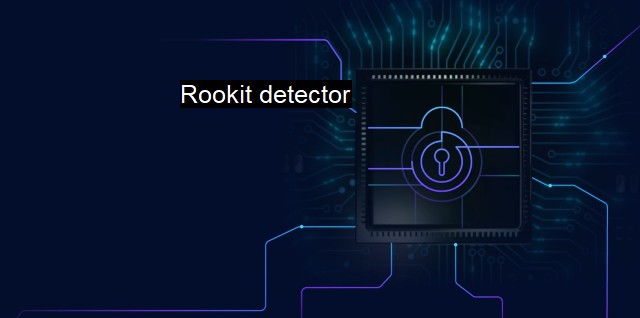What is Rookit detector?
The Importance of Rootkit Detectors in Cybersecurity: Detecting and Removing Malicious Malware
A rootkit detector is an integral component in the field of cybersecurity and antivirus software packages. it is a tool designed to identify and remove malicious software called rootkits, which often hide in operating systems and use their internal mechanisms to contaminate and control them.Rootkits are particularly dangerous forms of malware due to their nature and capabilities. They are designed to get root or privileged access to a computer system, therefore having a similar level of control as the system's administrator. A rootkit can manipulate and control normal operating system activities, often while concealing its own presence. Rootkits can mask the operation of other malicious software, like bots or keyloggers, effectively making them invisible to conventional antivirus software. They can access sensitive information, modify system configurations, alter software—often antivirus programs—,or even control the entire system.
Due to its likely damaging effects, the invention and employment of a rootkit detector utility is of paramount importance. A rootkit detector is a robust and precise tool modelled to find and eliminate rootkits from a system. Such tools scan the system's hard drive and other storage devices for known rootkit-like behavior. Certain rootkit detectors leverage a behavioral-based approach and search for anomalies in system behavior that may signal a root.ini infection.
Advanced rootkit detectors can dig deep into a system and analyze vital signs of a rootkit infection. This includes inspecting parts that conventional antivirus software may overlook, such as the system's kernel—a central part in an operating system. Kernel rootkits alter its functionality and thereby cover their tracks and experience little to no exposure. A reliable rootkit detector would have the ability to analyze the kernel's code and compare it to known safe versions in order to identify any possible alterations.
Cutting-edge rootkit detectors may summon cloud-based technology, processing architecture, heuristics, and artificial intelligence to power the detection and removal process. Drawing from these resources, a rootkit detector can identify anomalous behavior, patterns or instructions that potentially signal the presence of a rootkit with enhanced accuracy and speed.
Automatic updates are equally worth mentioning here, as they play a crucial role in the effectiveness of rootkit detectors. Cybercriminals continually work to develop advanced rootkits that can evade detection. Therefore, it is important for rootkit detectors to be regularly updated with the latest malware definitions and detection mechanism improvements, enabling the rootkit detector to reckon with and remove the latest versions of these intimidating threats.
Also, certain rootkit detectors come with cleansing capabilities. These allow then to not only detect but also remove or render harmless the recognized rootkit. This is guided by algorithms and methods designed to undo the damage caused by the rootkit, which includes the recovery of altered system's files and reestablishing a secure environment.
In the end, adopting and using a rootkit detector keeps the system free from under stealth attack by these notorious cyber threats. It is however important to remember that these systems alone are not usually enough to ensure complete system protection—they are only one element of a broader defense strategy. Quelling the threat of rootkits is then a surface aspect of the wider task of keeping IT systems secure—an effort that needs a comprehensive antivirus solution, firewall, spam filter, and most importantly, sober cyber habits. In response, a greater understanding of rootkit detectors is useful as we pursue cybersecurity and data protection.

Rookit detector FAQs
What is a rootkit detector?
A rootkit detector is a type of cybersecurity software that is specifically designed to identify and remove rootkits, which are malicious programs that are designed to hide their presence on a computer system. Rootkit detectors are an important tool in the fight against malware and can help protect users from a wide range of cyber threats.How does a rootkit detector work?
Rootkit detectors work by scanning a computer system to identify any signs of rootkit activity. This can include looking for hidden processes, files, and registry entries that are associated with known rootkits. Once a rootkit is identified, the detector can remove it and help to repair any damage that may have been caused by the malware.Why is it important to use a rootkit detector?
Rootkits are one of the most insidious types of malware, as they are specifically designed to evade detection by traditional antivirus software. This means that even if you have a robust antivirus program running on your computer, you may still be at risk from rootkit infections. Using a dedicated rootkit detector can help to supplement your existing cybersecurity defenses and provide an additional layer of protection against these dangerous threats.What are some of the best rootkit detectors on the market?
There are many different rootkit detectors available, but some of the most popular and effective options include GMER, Rootkit Remover, and Malwarebytes Anti-Rootkit. Each of these tools has its own unique strengths and weaknesses, so it is important to do your research and choose the one that best meets your needs.| | A | | | B | | | C | | | D | | | E | | | F | | | G | | | H | | | I | | | J | | | K | | | L | | | M | |
| | N | | | O | | | P | | | Q | | | R | | | S | | | T | | | U | | | V | | | W | | | X | | | Y | | | Z | |
| | 1 | | | 2 | | | 3 | | | 4 | | | 7 | | | 8 | | |||||||